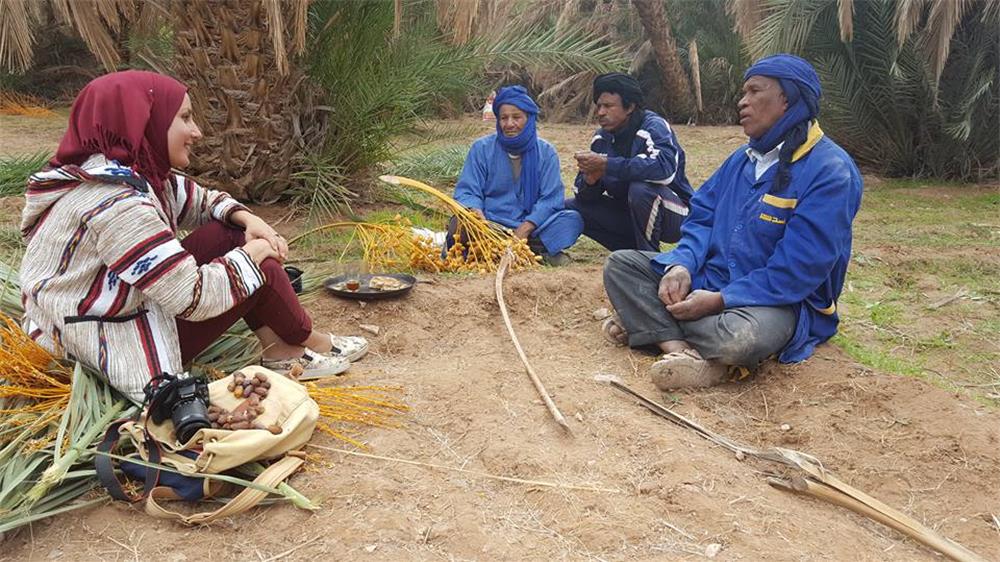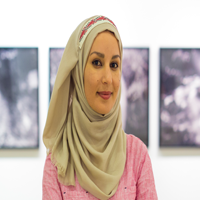ما هي المصادر التي يعتمد عليها صحفي مقيم في بلد آخرلإنتاج مواده الإخبارية؟ سؤال همّني كثيراً خلال تجربتي، لكنّ المؤكد أن الوسائل التي يعتمدها الصحفيون في كتابة أخبارهم أو مقالاتهم أو تقاريرهم المطوّلة مختلفة، بعضهم يوظف ما تعلّمه في الغرف الإخبارية، وبعضهم ينطلق من علاقاته الشخصية مع صحفيي الميدان أو مكاتب التحرير.
لم أكن يوماً ابنة غرفة أخبار حقيقية، بل صنعت غرفة أخبار خاصة بي في منزلي على جهازي الحاسوب، أسجّل الأرقام وأتواصل تدريجياً عبر شبكة المعارف التي أسستها وأهبط إلى الميدان وأعمل.
قد تكون القضية انقضت واستهلكها الجمهور، لكني كنت أحتاج دوما وقتا إضافيا لأصل إلى المصدرين الرسمي وغير الرسمي لأضفي زاوية أو معلومة جديدة حول ما يحدث. كان يتبادر إلى ذهني دائما أن أسأل الصحفيين في مواقع إخبارية صغيرة ومؤسسات كبيرة هل يصلون سريعا إلى المعلومات ومصادرها؟ وكيف يصوغونها بسرعة ويقدمونها للجمهور؟
أدركتُ بعد فترة أن هناك كتابة مغايرة ومتمهلة.. كان ذلك عندما سمعت بمشكلة نصب عمود لتقوية شبكة الإنترنت في ساحة "التحرير" بالعرائش، كنتُ حينها قد قرأت الخبر على موقع إخباري محلي. تظاهر العرائشيون وكانوا يحتاجون دعما إعلاميا لتوصيل أصواتهم وإسناد قضيتهم أمام شركة الاتصالات، حتى ارتدَّت الأخيرة عن فعلتها. صحيح أنني كتبت الخبر حينها وقلت بأن الساحة مهمة، لكني أفهم اليوم أنّها "خط أحمر" بالنسبة للسكان، ولا يمكن لأحد العبث بها نظراً لمكانتها الوجدانية. لو ذهبت حينها إلى الميدان واستقلّت سيارة أجرة من طنجة إلى العرائش -ساعتين ذهاباً وإياباً- لفهمت التاريخ والوجدان ولكتبت تقريرا مغايرا. حتى الموقع الذي اطلعت عليه لم يوضح لي أو لغيري لماذا الساحة مهمّة.
هكذا إذاً، أعتمد بشكل أوّلي على المستجدات التي تحاول المواقع الإخبارية المحلية تغطيتها وإنجازها، وأعتقد أن غالبية الصحفيين في المغرب يعتمدون أيضاً من مواقعهم على بعض الأخبار الواردة من هنا وهناك، أي من مواقع الأحداث. كيف لي أن أفهم مشكلة العطش في زاكورة إن لم أكن أتابع من موقعي بطنجة ما تقوله مواقع الأخبار المحلية هناك وما يقوله الصحفيون والصحفيون المواطنون حول ما يدور؟ كيف لي أن أعرف أنّ طبيبة أطفال كاد يصيبها الاكتئاب بسبب تردّي المستشفى الحكومي في زاكورة ثمّ حوّلته بجهودها وطاقتها إلى جنّة، إنقاذاً للأطفال وأمهاتهم اللواتي فقد بعضهن أطفالهن أثناء الرحلة الطويلة إلى مراكش أو الرباط؟ لم أكن أعرف بقصتها إلا من موقع محلي، لكني أضفت أنها تؤدي عملا عظيما عندما تنقذ أرواح الأطفال وطالبت بأجهزة وتبرعات لإنقاذ المستشفى المأساوي.
كيف لي أن أعلم بقصة الشاب المجتهد الذي تغلّب على إعاقته في تطوان، ونجح في الثانوية ووشحه الملك وساما، ومن ورائه قصة أمه العظيمة التي صبرت طويلاً لأجله؛ إلا من موقع محلي بتطوان؟
ذلك دور الإعلام المحلي، يحكي قصص الناس والمدن وما يجري فيها. يجد العاملون في الإعلام المحلي بالمغرب أن هناك نظرة إجحاف بحقهم، إذ حاول معظمهم أن يكون صحفيا ينقل أخبار مدينته، دون أن يكون حاصلا على تأهيل أكاديمي أو تدريب مهني، ولهذا تعتقد المؤسسات الإعلامية أنهم "معتدون" أو "متطفلون" على الصحافة، في حين أنه لولا عملهم لظل الاهتمام الإعلامي منصبا على المدن الكبرى فقط كالدار البيضاء والرباط، المدينتين اللتين يفضل أغلب الصحفيين الإقامة فيهما وكأنهما تبيضان ذهبا.
كانت أغلب المواقع المحلية في المغرب تتعطل نتيجة قلّة مواردها المالية والبشرية، فتغلق أو تعلّق لفترة وتعود للنشر. أما اليوم، فهناك تحدٍّ أكبر يتمثلّ في القانون رقم 88.13 الذي نشرته الحكومة المغربية يوم 15 أغسطس/آب 2016، ويتعلق بالصحافة الإلكترونية والنشر.
في مقال نشر للزميل كريم البابا بمجلة "الصحافة" حول الموضوع، طرح تساؤلاً يخص مصير المئات من المواقع المحلية والجهوية في سياق "توفير مدير نشر" تتوفر فيه شروط مثل حصوله على شهادة في الصحافة وصفة الصحفي المهني، وطلبت من المواقع الإخبارية تسوية وضعيتها وفقاً لذلك.
وقبلت وزارة الاتصال والثقافة المغربية -حسب المقال- ملف 12 موقعا إخباريا إلكترونيا من بين أكثر من أربعين موقعا في مدن شمال المملكة. ففي طنجة مثلا، نجحت خمسة مواقع في الحصول على الموافقة بينما رُفض أكثر من 15 موقعاً. ولم تختلف النسبة في جارتها تطوان، وهي المدينة الثانية في الجهة، إذ كسبت سبع صحف إلكترونية الرهان، مقابل رفض القضاء الموافقة على 20 موقعا آخر، في حين تحققت شروط الملاءمة في بوابة إخبارية واحدة بمدينة شفشاون من بين خمس من نظيراتها. أما في مدينتي الحسيمة والقصر الكبير فلم تتوصل السلطات بأي طلب بالنسبة للأولى، ورُفضت الطلبات في الثانية.
منذ فترة ليست قصيرة -عامين على الأقل- كنت أقرأ حول الاهتمام المتصاعد في الولايات المتحدة، خاصة فيما يتعلق بتطوير "الأخبار المحلية". ومن حين لآخر يصدر تقرير حولها وينشر على الموقع الرائد في تحليل الإعلام وتقاطعه مع التكنولوجيا "Media shift". أحالني أحد المقالات إلى مؤسسة مختصة بالحديث عن "الأخبار المحلية" بعنوان Lacalnewslab.org.
"الناس جائعون للأخبار المحلية وتتبّع القضايا المحلية والنقاشات عن كثب"، هذه نتيجة استخلصها الصحفي جوش ستيرن عبر عمله اليومي، وكتبها في مقاله "ردم الفجوة في الأخبار المحلية"، وعززها تقرير نشره مركز الأبحاث"Pew" بإحصائية تخلص إلى أن قرابة "تسعة أعشار السكان يتابعون الأخبار المحلية عن كثب"، مما يدل على حيوية هذا الإعلام.

خدمة للمكان أم للمجتمعات؟
يُقصد بالصحافة المحلية عادة تغطية الأحداث والفعاليات في سياق محلي قد لا يكون مهماً لمحليين آخرين، ويطلق على الفئات المستهدفة في هذا السياق اسم "المجتمعات".. هذا ما قاله أستاذ الصحافة بجامعة ولاية أوريغون الأميركية داميان رادكليف في مقاله "ثمانية اتجاهات رئيسية في الصحافة المحلية".
اختلف معه صاحب كتاب "الصحافة المحلية في عالم الديجيتال" بال غرايف ماكميلان وأطلق عليها تعريفاً مغايراً، وهو "الشعور بالمكان وفهمه"، وعلل بأنّ المجتمعات التي تشترك في خلفيات دينية أو إثنية أو اجتماعية معينة يمكن ألّا يحدّها مكان جغرافي محدد، كشبكة الأصدقاء الذين يتشاركون اهتمامات معينة، إلى أغلبية المجتمعات السياسية أو الدينية. ويقول بأن الشعور بالمكان وفهمه يختلف عن المفهوم الجماعي والتماسكي للمجتمع، بحيث لا يفترض تعريفه بأن الأفراد يمتلكون قيماً ووجهات نظر مشتركة لأنهم يقيمون في بقعة جغرافية معينة أو تربطهم علاقة به.بيد أن بحث "Pew" خلص إلى أنه من الفرادة أن تمتلك المجتمعات أفكاراً مختلفة لما تريده من الأخبار المحلية، إذ لكل مدينة أولوية مختلفة حول المواضيع المراد تغطيتها، فالأخبار المحلية ليست مقاساً يناسب الجميع، وتظلّ بالمقابل "صوت الأخبار الوحيد في المجتمع"، أو كما تُعرف في المغربباسم "صحافة القُرب"، فهي ترصد تغيرات المدن أو البلدان أو القرى وتأثرها بالهجرة والمناخ والتقلبات الاقتصادية والحروب وتبدل الثقافات والأحوال الاجتماعية.
مفاتيح يومية للأخبار المحلية
الحدث اليومي أساس هذا النوع من الصحافة. فقد يحدث أن يرصد أحدهم كيف تتصحر منطقة ما بفعل التغيرات المناخية، ويتابع تأثير المناخ على هجرة الإنسان والحيوان، وزحف الرمال ونتائج ذلك على المنطقة.. هي رصد يوميّ إذاً، متمهل وصبور.
يضع رادكليف سؤالاً مفتاحياً لهذا الحدث اليوميّ، ووفقه تسير طاحونة الأخبار فتجري المياه.. السؤال: "كيف يمكن لي كصحفي/ية أن أساعد المجتمع/الناس في حياتهم اليومية؟"، وهو ما يولد أسئلة جديدة وطرقاً للإبداع ويتناول القضايا التي تهم المواطن حسب الأولوية.
وبما أن التفاعل حقيقي في الاتجاهين بين الصحافة المحلية والجمهور، مما يعني مزيداً من المعلومات في ميدان الفنون والرياضة والقصص والاحتياجات الخاصة بالأفراد، أي تقديم إعلام خدماتي بالنهاية، لذلك تحتاج هذه المنافذ أو الوسائل إلى تقديم شيء مختلف من حيث المحتوى والمنظور والقيم الصحفية، لأنه لا يمكن العثور على جزء كبير من هذا المحتوى في مكان آخر؛ فما يحدث بمدينة أو منطقة في شمال المغرب لا يشبه ما يحدث في مدينة بالجنوب بسبب اختلاف اللهجات والثقافات.
وكلّما استطاع الصحفي أن يذهب أبعد وأعمق في تلك المناطق بما يهم القارئ ويضمن أن الجمهور بحاجة إلى أخباره ولا يمكنهم الحصول عليها من مكان آخر، ضَمِن الاستمرارية والاستدامة لأعماله. وهذا يأتي بالاستماع الجيد للمجتمعات المحلية، وحرص الصحفيين على استكشاف أساليب مختلفة لحرفتهم، والحفاظ على الاستقلالية والنزاهة، ثم تسخير المنصات الرقمية لرواية قصصهم، واستخدام الفيديو ووسائل التواصل الاجتماعي لإشراك الجمهور ومشاركتهم الأخبار. يُقال بأن "دور الصحفي المشارك في القرن الـ21 ليس للإعلام فقط، ولكن لجلب القراء مباشرة في النقاش أو المحادثة".
فاكهة "التنين".. ما الغريب؟
رغم عيوبها وسطحيتها، يقول رادكليف إن الصحافة المحلية عمود إنارة يلتفت إليه الأفراد الذين هم أكثر دراية بشؤونهم المحلية وأكثر انخراطاً في مجتمعاتهم وسياساتها لكونها وسيلة الاتصال الوحيدة بين الطرفين.
تعرقلَ تطور الصحافة المحلية في مرحلة ليست بعيدة بسبب ظهور تقنيات وسلوكيات رقمية جديدة، إضافة إلى تقييد حرية التعبير في بلادنا العربية وقوانين الصحافة الإلكترونية المرتبط بعضها بالقانون الجنائي كما حدث مؤخراً في المغرب، فضلاً عن تحديات كبرى تتعلق باستمرارية الدعم واستقطاب الجمهور.
رغم ذلك شهدت بلاد عربية تجارب أحدثت فرقاً في المشهد الإعلامي كتجربة راديو "البلد" في عمّان، وتجارب مشابهة في فلسطين التي وظفت استراتيجيات التجريب واستيعاب التطورات لضمان الاستمرارية، وعلى غرارها أيضا تجارب لإذاعات تبث على الإنترنت ظهرت في المغرب وتستهدف مجتمعات خاصة، لكن ما زالت أوضاعها القانونية والمالية متضعضعة ومتفاوتة.
رُبّما تبدو الصحافة المحلية كشجرة فاكهة "التنين" الغريبة التي بدأ الناس يتذوّقونها ويطلبونها في المطاعم لغرابتها والفوائد التي تحملها، ويبقى أن نشجع العاملين على تقديمها بأشكال مغايرة، إبداعية في الذوق والشكل أكثر.








































